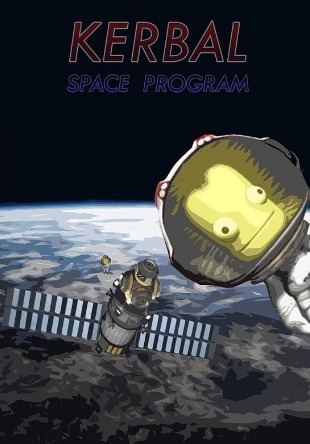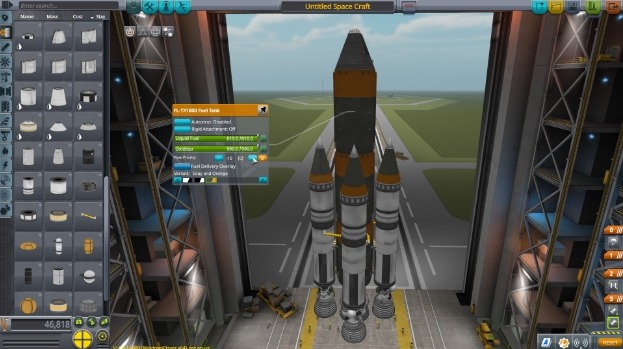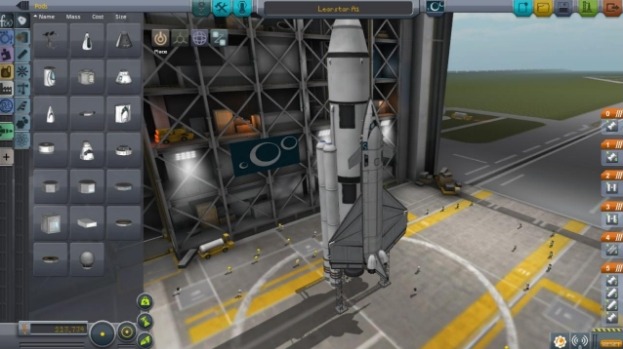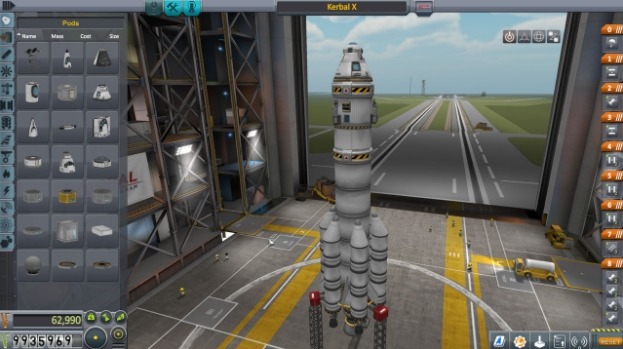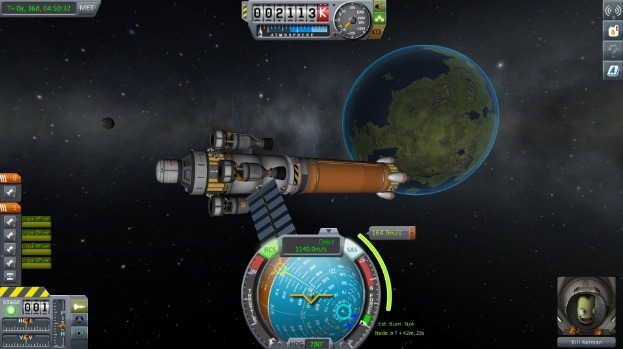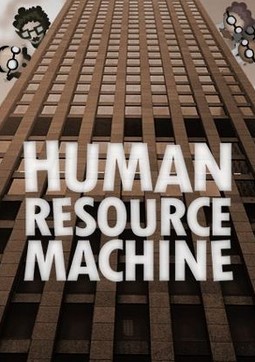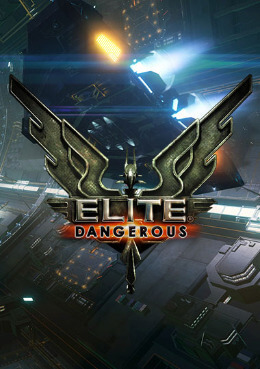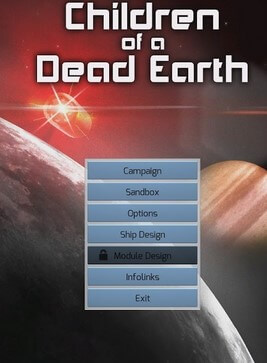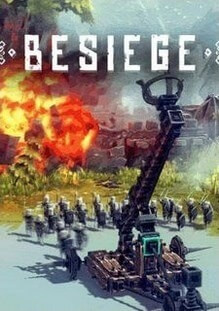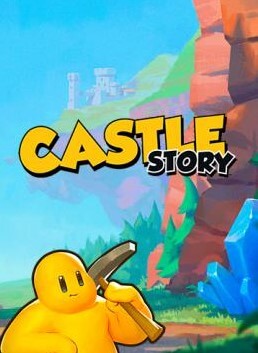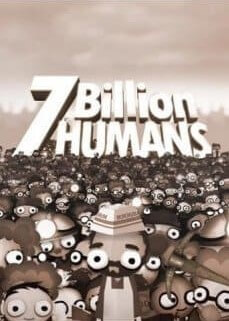Players can create rockets, aircraft, spaceplanes, rovers, and other craft from a provided set of components. Once built, the craft can be launched by players from the KSC launch pad or runway, or other launch pads and runways around Kerbin, in an attempt to complete player-set or game-directed missions while avoiding partial or catastrophic failure (such as lack of fuel or structural failure). Players control their spacecraft in three dimensions with little assistance other than a stability system called "SAS" to keep their rocket oriented. Provided it maintains sufficient thrust and fuel, a spacecraft can enter orbit or even travel to other celestial bodies. To visualize vehicle trajectory, the player must switch into map mode; this displays the orbit or trajectory of the player vehicle, as well as the position and trajectory of other spacecraft and planetary bodies. These planets and other vehicles can be targeted to view information needed for rendezvous and docking, such as ascending and descending nodes, target direction, and relative velocity to the target. While in map mode, players can also access maneuver nodes to plan out trajectory changes in advance.
Missions (either player-set or assigned "contracts") involve goals such as reaching a certain altitude, escaping the atmosphere, reaching a stable orbit, landing on a certain planetary body, capturing asteroids, and creating space stations and surface bases. Players may also set challenges for each other on the game's forums, such as visiting all five moons of Jool (the in-game analog for Jupiter), or use mods to test each other's spacecraft in air combat tournaments.
Players can control in-game astronauts, known as Kerbals, who can perform extravehicular activities (EVA). While on EVA, Kerbals may use their EVA suit propellant system to maneuver in space and around craft and space stations, similar to the use of NASA's Manned Maneuvering Unit. Actions that can be performed while on EVA include repairing landing legs, wheels, and parachutes. Kerbals can also collect material from science experiments, allowing them to store data inside the ship's capsule. During an EVA on any solid planet or moon, a Kerbal can place a flag or take a surface sample.
Historical spacecraft can be recreated and their accomplishments mimicked, such as the Apollo program, the Mars Science Laboratory rover, or the International Space Station. Players may install mods which implement destinations, weapons, rocket parts, and goals, such as attempting challenges in a real-scale solar system. Mods can also add informational displays showing craft and orbital statistics such as delta-v and orbital inclination. Some mods have been added into the game officially, due to popularity. For example, resource mining, in order to obtain Ore for refining into resources such as fuel, has been officially implemented from a popular mod.
As of version 1.7, the major celestial bodies in the game in order of their proximity to the parent star, the Sun, are Moho, Eve, Kerbin, Duna, Dres, Jool, and Eeloo (respectively analogs of Mercury, Venus, Earth, Mars, Ceres, Jupiter, and Pluto). Community modifications are able to expand this planetary system to include analogs of the missing outer planets, as well as fictional bodies and faraway exoplanet systems.
Game modes
The player starts a new game by choosing one of three game modes: sandbox, science, and career mode. In sandbox mode, players may attempt to construct a suitable vehicle for any desired project without penalties for failure and entirely user-assigned missions. Many players have constructed unrealistic spacecraft in this mode, such as impractically large, complicated, or expensive rockets. This mode is also frequently used to create replicas of real-life aircraft, rockets, trains, boats, cars, and other types of vehicles.
In science mode, the initial selection of parts is limited. More complex parts can be unlocked in the Research and Development building by advancing "science" with various experiments on Kerbin and elsewhere throughout the solar system. This mode was designed to ease new players into the game and prevent them from getting overwhelmed.
Career mode extends science mode by adding funds, reputation, and contracts. To build and launch new rockets, the players must complete contracts, earning funds to pay for the necessary parts. Reputation affects how many contracts are given to the player; less reputation leads to fewer, lower-quality contracts. Declining a contract will reduce the likelihood that a contract of the same type will appear later. Simultaneously, players must upgrade buildings in the space center to unlock new features such as improved tracking, higher spacecraft mass limit, larger part count limit, and increased available contracts.
Currencies
There are three 'currencies' in Kerbal Space Program: Science, Credits or Funds, and Reputation. Although credits are the in-game analogs of money, Science and Reputation are referred to as currency as well. In Sandbox mode, no currencies are available, as there is no need for them. In Science mode, only science is available. All three currencies are available in Career mode.
Science is gained by performing experiments or crew reports. The experiments can only be turned into Science through either transmissions via antennae or recovery of a craft on Kerbin. Recovery of an experiment is worth more science than transmitting it. Each time an experiment is turned into science, it is worth less science the next time it is recovered, until it is worth no Science at all.
Funds, or credits, can be obtained in two ways: One; completing contracts by various agencies, and Two; by exploring new celestial bodies (in which a record-keeping society rewards you with a few thousand funds). The Kerbin World Record-Keeping Society does have contracts; however, the rewards for exploring celestial bodies are not contracts. Contracts are accepted through the Mission Control building in KSC, and are completed during flight.
Reputation is gained through successful missions, and lost through failed ones. It is essentially how safe Kerbals believe it is to fly on your spacecraft. More reputation results in better contracts.
